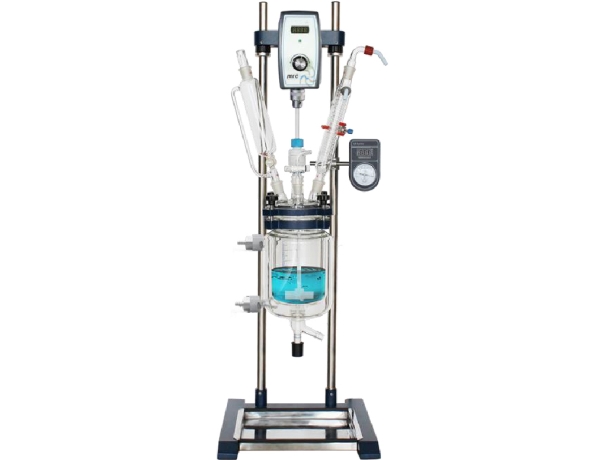Laboratory reactors are used to optimize reactions and process flows in chemistry experiments.
Frequency double glass reactor works: injecting high or low temperature (heating or cooling) circulating fluid through the double reactor sandwich material within the reactor constant temperature heating or cooling, the material carried out in reactor reaction (decomposition and compounds). Speed evaporation, reflux and collected and can control the reaction of the bath, after completion of the reaction, the autoclave surplus materials from the bottoms of the discharge port release, the operation is extremely convenient.
How Laboratory Reactors Work
Laboratory reactors allow researchers to set up and control chemical reactions under various conditions. Reactants are introduced into the vessel, and parameters like temperature, pressure, and agitation are adjusted to achieve the desired reaction rate and yield.
Applications of Laboratory Reactors
Laboratory reactors are used across numerous fields, enabling researchers to create and test new products or analyze environmental samples.
Chemical Synthesis
In chemical synthesis, They help in optimizing reaction conditions to produce desired chemical compounds, from pharmaceuticals to polymers.
Pharmaceutical Research
Reactors allow pharmaceutical scientists to test different synthesis routes and optimize them for scale-up, helping to develop new medications efficiently.
Material Science
From nanomaterials to advanced composites, They are important in creating and testing new materials for strength, durability, and chemical resistance.
Environmental Testing
Environmental scientists use reactors to test water samples, study pollution mitigation techniques, and evaluate the environmental impact of various chemicals.
Choosing the Right Laboratory Reactor for Your Needs
Selecting the ideal laboratory reactor requires consideration of multiple factors to match your research needs and constraints.
Scale and Volume
The reactor size should fit the scale of the experiment. Larger-scale reactions may require reactors with higher capacity and flow control.
Temperature and Pressure Requirements
Each reaction has specific temperature and pressure needs. Choosing a reactor that can handle the required extremes ensures experimental reliability.
Chemical Compatibility
The materials used in the reactor must withstand the reactants without corrosion or degradation, especially for highly reactive or acidic chemicals.
Advantages of Using Laboratory Reactors
They offer unparalleled control, allowing for safer and more effective experimentation. They are essential in optimizing reaction efficiency, reducing waste, and enhancing safety.
Safety Considerations When Using Laboratory Reactors
While laboratory reactors offer control and precision, they must be operated with care. Ensure proper ventilation, use appropriate safety gear, and be aware of emergency shutdown procedures to manage risks.
what is Explosion Proof Laboratory Reactor
An Explosion-Proof Laboratory Reactor is a specialized reaction vessel designed for safe chemical processing in environments where there is a risk of explosive reactions or flammable gases. Explosion-proof reactors are constructed to meet strict safety standards, often involving high-quality materials and robust engineering to contain or withstand explosions, making them suitable for hazardous labs, including chemical, petrochemical, and pharmaceutical labs.
